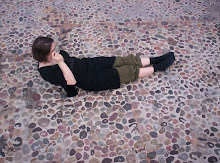Thursday, 20 May 2010
Monday, 17 May 2010
as-much-dignity-as-I-can-muster
Anyone who has innocently faced a DWP doctor will know that it’s no mean feat passing/failing a medical. At my examination I had such points as “touched face twice” & “found something in her bag without much difficulty” noted, advising clerical staff of my apparent ability. But really, if you live with chronic pain, you eventually learn to live without wincing, or rather you learn to internalise the wince. An observer may be unaware of the pain & discomfort that these routine acts provoke. However, if you want to feign illness or pain to pass/fail a medical, you make damn sure you make every action appear as difficult as possible.
Are there really so many convincing actors out there? Is it really correct to assume that people’s ability to cope in one-off situations is indicative of their overall ability to survive?
My desire is to appear normal when in the outside world. It’s hard when you hobble, when after 5 steps you experience stabbing pain, when you genuinely limp on alternate legs. It’s tricky when lifting the smallest items you get that searing sensation. “The outside world” certainly knows nothing of the resting, pacing, recumbence, quiet (before & after) required to even be in the outside world. It’s called as-much-dignity-as-I-can-muster.
And it’s so infrequent. People with normal, busy lives, full health, may not miss you, but you miss them.
So on to talks of cuts to disability benefits. You can bet that it is the people who suffer excruciating pain & exhaustion at the simplest task that will be the first for the chop. Because it is subjective. Because it is self-reporting. Because often the mechanism isn’t damaged, it’s a neurological problem. And there is no definitive answer, no consensus. Even with WHO endorsement, we face a barrage of disbelief when we consult our GP and so-called experts canvass to entrench stigma further. There is no drug that is universally helpful. There is a tiny budget for research; often what little research is done is considered extraneous because it provides no clear, clinical indications. It is easier (lazier?) to classify us as psychiatric patients and invest money in that.
Because of these factors, we are almost certainly responsible for the government deficit. We are uniquely “scrounging” to the detriment of the good, honest, hard-working tax-payer. We deserve to struggle on next to nothing. We should be out working, churning the corporate cream, not sitting on our backsides expecting the state to fund our psycho-somatic neuroses!
This is what I read, constantly, when any mention of “disability” and “benefits” and “ME/CFS” is contained within a sentence ….
I’m by no means the worst affected, probably a “moderate” sufferer, yet every single day is a struggle to get to the bathroom, make food, eat etc. There are peaks, there are troughs. If I have done nothing for a week, I can either amaze myself at what I can achieve, or else feel frustrated that I need even greater inertia.
I’m sorry about all this. I’m sorry I can’t contribute. I’m sorry I ask you to help me out at this difficult time…
My previous life was so much fun. I spent the day either doing my “constitutional”, which was a two-steep-hill 10 mile walk with a pushchair, or else cycling 15 miles with a child on the back. Picnics, fun, nature, whatever the weather. Then in the evenings I would go out to work running a restaurant. For holidays I would go on walking or cycling trips with my daughter. I never stopped. I was happy, fit and independent.
Then I had some mean old virus that laid me up for weeks and never recovered. I tried to; carried on attempting to work for 3 months after diagnosis when I could barely walk, tried to go for walks that would result in collapse. I went to the doctor because I was worried I had anaemia. When tests proved my iron-levels were good, she suggested I had M.E. I was lucky I had an early diagnosis, which prompted me to stop eventually, as not stopping could have been dangerous, I was a mess.
Three years later and I still have the optimism to call this temporary. I still make plans for the future, I still believe I can make a significant contribution to the world in some way. Every illness delivers unexpected gifts and for me having to take time and space and quiet has left me psychologically stronger than ever before, despite the fact that at my psychiatric assessment I was pronounced as sane as can be.
Why would anyone suppose I was malingering? I’m a single parent without much support, desperately trying to do the best for my child. I’m constantly “taking hits” (ie exhausting myself & causing massive pain that lasts weeks) for her pleasure in life. No one has ever mentioned GET to me, I imagine because it is patently obvious I do far more than I am really up to doing in being a responsible & loving parent. If you need evidence that ME’s symptoms are provoked by activity rather than non-activity, look at me. I can’t sit on my bottom all day, much as I feel like I need to. And yet the more I do the less I can do. ME advantages me in no conceivable way. It only makes me cry that I have to disappoint my daughter so frequently.
In terms of benefit withdrawal, I feel I can say with some authority that the harder things get, the harder they become.
Subscribe to:
Comments (Atom)
